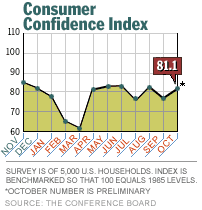NEW YORK (CNN/Money) -
Consumer confidence rose in October, a research group said Tuesday, in a report that was slightly stronger than Wall Street forecasts.
The Conference Board, a business research group based in New York, said its closely watched index of consumer confidence rose to 81.1 from a revised 77 in September. Economists, on average, expected the confidence index to rise to 79.3, according to Briefing.com.

The Conference Board's "expectations" index, which measures how consumers feel about the future, rose to 90.7 from a revised 88.5 in August. The "present situation" index rose to 66.8 from a revised 59.7.
As for perceptions of the job market, the percentage of consumers saying jobs are "hard to get" fell to 33.8 from a revised 35.1 in September.
"A more favorable job market was a major factor in the turnaround," said Lynn Franco, director of the Conference Board's Consumer Research Center. "And the belief that this trend will continue has boosted expectations."
Separately, the Commerce Department reported a gain in demand for durable goods manufactured in the United States in September.
U.S. stock prices continued to rise after the report, while Treasury bond prices fell.
Wall Street keeps a close eye on consumer confidence, since consumer spending makes up more than two-thirds of the total economy.
| Related stories
|

|
|
|
|
But consumers don't always spend the way they feel; despite a recession, terror attacks, two wars, a bear market in stocks, corporate accounting scandals and more, consumers have continued to spend in recent years.
Still, consumers' attitudes about the economy have been especially shaky in recent months, amid the longest labor market slump since World War II.
Though recent signs of improvement in the labor market -- including lower numbers of weekly claims for unemployment benefits and a small gain in non-farm payrolls in September -- boosted the Conference Board's confidence index in October, it's been basically stagnant since May, when it rebounded from its deep slump during the U.S. war with Iraq.
Meanwhile, following a dramatic third-quarter surge in consumer spending, retail sales have slowed down in recent weeks. But economists doubt sales will fall off the table, and many hope October's increase in confidence points to better sales down the road.
"To some extent, this downturn in the pace of sales may hold a silver lining for the upcoming holiday season, as consumers build up their savings ahead of holiday spending," said Michael Niemira, senior economist at Bank of Tokyo-Mitsubishi, which releases weekly reports on chain-store sales.
The Conference Board's report came as Federal Reserve policy makers met to discuss the economy and their target for short-term interest rates. The Fed cuts its key short-term rate when it wants to spur economic activity and raises rates when it wants to fight inflation.
After making 13 rate cuts since early 2001, which have boosted the housing market and consumer spending, the Fed's next move seems most likely to be a rate hike, if economists' predictions of an economic rebound are true.
But that rate hike might not come until the middle of next year at the earliest, many economists believe, because the labor market may be slower than usual to fully recover.
Labor market weakness has slowed down wage and salary growth in recent years, and consumers acknowledged the pinch in the Conference Board's survey; the percentage of consumers expecting their incomes to rise fell to 16.7 percent from 19.0 percent in September.

|

